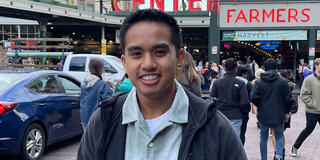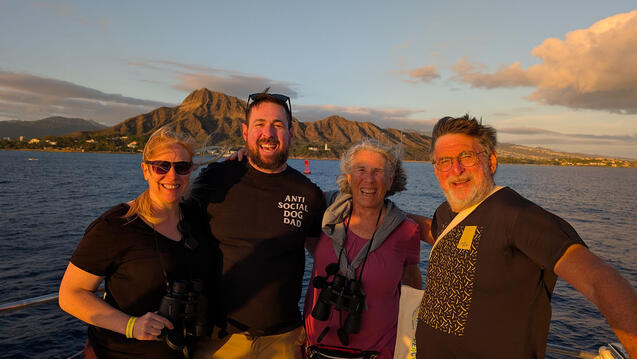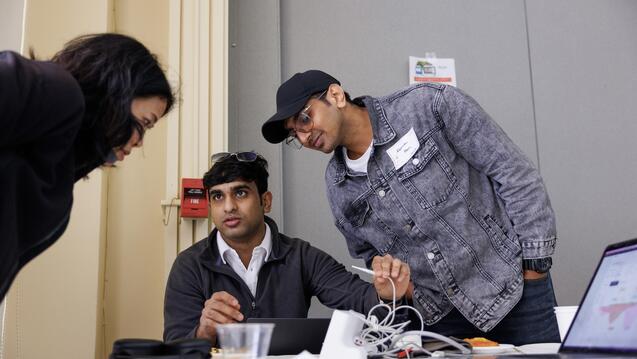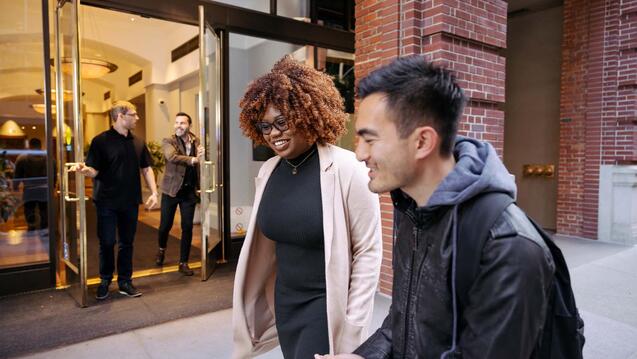Meet Kenneth Cacacho '21

He gives his best advice on job-hunting, working with Adobe, and the skills he learned in the entrepreneurship and innovation program.
Why did you choose USF?
I wanted to stay in the Bay Area because I was thinking of opportunities after college, and the Bay Area has all these tech companies that I was really interested in learning about, plus startup culture, food culture, different ethnicities, you name it. Second was the program. I was always an entrepreneur. When I was a kid, I actually had an at-home baking business where I sold to my friends and my family in high school. I was at school, I was selling to teachers, the principal, and catering to the prom and the winter balls. So it was really cool to put an entrepreneurial hat on. You kind of learn various roles of talking to customers, the finance and the marketing side. Looking at schools that have an entrepreneurship degree, USF drew me right in.
What did you love about your major? You mentioned baking in high school; have you always had that mindset of business and starting your own business?
I definitely had that mindset to start a business, run a business, and how to grow one. The different facets of creating a business in terms of marketing, finances, sales, are super important, and the specific entrepreneurship program had courses that, in the beginning, I didn't know too much about. The first course was around designing your own website and your own online business with Professor June Lee. That was super eye-opening, because it's all hands-on entrepreneurship. That was the first intro class, Intro to Entrepreneurship, and that got me hooked. Other classes that really piqued my interest were entrepreneurship curriculum classes. It's mandatory to have an internship on the side as well, and you talk about your internship experience in the class. So that was really helpful because the professor helps you get an internship paid or unpaid, and it still counts as credit to the class. The last class that was really interesting was the capstone, the final course before you graduate. Kind of an accumulation of everything where you design your own business with the team and you pitch it, just like Shark Tank.
What are you doing now?
I've been working at Adobe for one and a half years. Even though it says senior business development rep on my title, I still think I'm a newbie or new to the company. I got this internship from Adobe, from the Adobe Sales Academy my junior year that summer, and it was virtual, when COVID just hit. Within sales, it showed me you really don't need to be in an office: you could still sell with your laptop and your phone. The internship portion was super critical because that was the chance for me to get to learn the company culture. Even through Zoom, I still met a lot of good people. I got to work with high level, experienced salespeople, and also it gave me a rundown of what I would be doing as a full-time business development rep. As an intern, I literally told the manager, “We have one month left in the internship. I'm going to get you 20 customers, 20 deals in the line.” And then all of a sudden, we had 30 to 40 at the end. So it was a no-brainer to convert to full-time, and that was the ultimate goal. I'm really thankful that I really locked in on the internship. Any advice to students out there is to really try to land an internship, because that's going to help you convert to full-time.
Were there any classes at USF that prepared you for what you do today?
Capstone would be the one that prepared you the most, because at the end when you do give a presentation, those presentation skills and speaking skills are so important. You don't want to bore the audience. You want to make it fun and lively like a Shark Tank pitch and answer questions at the end. The tone, those small elements really played into a factor of me performing very well in the internship and communicating with customers from really big companies today. I still use these tactics of communicating and presenting. Those are the soft skills that we should always home in on.
Another class was product engineering, where business students learn a little bit of engineering and the mechanics of it. Like how do you create a paper airplane? What's the most efficient way? And then you kind of test it and figure out which group’s airplane performs the best. Where the business side came into it was developing that product and then talking about the product. So again, pitching and presentation skills.
Did the class give you tips or teach you how to present?
Our professor, Nicole Nguyen, gave tips on how to speak and how to pitch. The best way to learn is to just jump in and get that feedback. Hearing the criticism or the critical feedback was always hard to swallow sometimes, but you do need to hear it. I hate looking at myself in a recording to hear my talking skills, but it's so important.
Was anything difficult about the job search that you were not expecting?
With the job search, in terms of full-time roles, I was looking a little bit, but deep down in my heart, it was Adobe. Just because of that internship experience and the people there, I always knew it was going to be Adobe, but I still looked at other companies to see what else is out there. I didn’t take anything away from the table. If I could tell myself back in day one before starting the full-time role, I would say don’t be afraid to talk to other people on the team and ask for tips and strategies, because you might be very timid being the new and young person starting at a big company. Within the culture, it's so welcoming. You hear all the time here, “Feel free to put 30 minutes on my calendar. We could chat.” And those coffee chats go a long way in terms of learning about people's careers.
It's not always a straight line with their careers and learning those tips for success in a role. Within sales, we have a number and a quota. How do you achieve that? What are your strategies and what happens if the quarter comes to a close and you didn't hit your metrics? How are you going to perform better? People have their own strategies and you won't know them unless you reach out.
What's been your favorite aspect of your work?
The first one would be getting to work with high-level experienced account executives in sales for 20-plus years. I work hand in hand with the account executives and we sell to accounts like Target, Amazon, Google, and I'm still entry-level. My idea is to bring customers to meetings, let the account executive take it from there, and just be a fly on the wall and hear how they open up conversations, understand customer problems, and discuss how we can fit and solve those pain points; that's an art. So the fact that I get to sit in those meetings — I do a little intro, but I just want to absorb that information because it's an art. You can't really study it or memorize it. It has to come up naturally. So that's one. And then two, just my other teammates. This team that I'm in is most of us just graduated from college, maybe had another sales gig before this. So we're all the same age and I'm really thankful that we're all still young and hungry. We learn from each other. Maybe we got off a bad customer meeting, but we talked to the team and we helped each other out.
What impact do you hope to make with your work?
At Adobe, it would be to transform our customers' digital experiences. Talking to customers every day, when you hear their processes, it's so manual, like, why are you faxing documents? What about Adobe Acrobat for your PDFs? It's a no-brainer for us, but for older companies, they're not used to it. They're still used to pen and paper and faxing. So talking about this digital transformation, helping them really improve their whole business, and then they'll see a return on their investment. Their employees work faster, more efficiently. So the ability to help these big companies do that is going to be rewarding and hopefully that drives impact. And then on the entrepreneurial side, thinking of some product or company or business to help people. The only idea I have right now is to replace plastic wrap. It's really bad for the environment, there’s so much of it, and I use a lot of it as a home cook. So what's the alternative for plastic? Can it be biodegradable and eco-friendly?
Do you have any advice for students who are graduating and going out into the world? Or advice for students who have just started their first job?
One is to still enjoy the college experience. My college experience got cut a year and a half short because of COVID, so it really did suck. Those friendships that you made and those relationships with professors are important because those connections that you build actually will help in your next stage. In another elective I took, a resume class, Professor Ko said, “It's not about what you know, it's about who you know. And it's what you do with who you know.” By senior year, she said, “By your senior year, it's not about who you know, it's about who knows you.” Relationships really matter. I mean, applied to 50, 60 internships, not hearing back. The fact that you can leverage your network and your friends, your family, that can really help you showcase that you're up for the role and put face to the name internally at that company you're trying to get at, makes such a difference just in terms of getting a callback. You wouldn't know unless you ask and that's where the courage comes to at least reach out and just give it a shot. You kind of develop that thick skin and you're just like, ‘Hey, I'm just going to send them [an email] and see what happens.’


